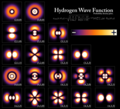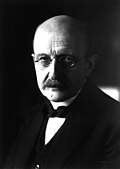Quantum mechanics
Quantum Mechanics is a fundamental theory in physics that provides a description of the physical properties of nature at the scale of atoms and subatomic particles. It is the foundation of all quantum physics including quantum chemistry, quantum field theory, quantum technology, and quantum information science.
Introduction[edit]
Quantum mechanics differs from classical physics in that energy, momentum, angular momentum, and other quantities of a system are restricted to discrete values (quantization), objects have characteristics of both particles and waves (wave-particle duality), and there are limits to the precision with which quantities can be known (uncertainty principle).
History[edit]
The development of quantum mechanics was initially motivated by two observations which all classical physics could not explain. The first was the black body radiation problem which was first proposed by Max Planck in 1900. He suggested that the energy in electromagnetic waves could only be released in 'packets' of energy. In 1905, Albert Einstein interpreted Planck's quantum hypothesis realistically and used it to explain the photoelectric effect. The second was the spectral lines problem that was solved by Niels Bohr with the introduction of the Bohr model of the atom in 1913.
Principles[edit]
Quantum mechanics is a significant part of understanding the universe and its workings, as it provides a mathematical description of much of the dual particle-like and wave-like behavior and interactions of energy and matter. It introduces a critical change to the fundamental understanding of physics, with two main principles:
1. Superposition Principle: A physical system - such as an electron in an atom - exists in all its theoretically possible states simultaneously; but, when measured or observed, it gives a result corresponding to only one of the possible configurations.
2. Uncertainty Principle: This is one of the most famous (and probably misunderstood) ideas in physics. It tells us that there is a fuzziness in nature, a fundamental limit to what we can know about the behavior of quantum particles and, therefore, the smallest scales of nature. Of these scales, the most we can hope for is to calculate probabilities for where things are and how they will behave.
Applications[edit]
Quantum mechanics has been instrumental in understanding the behavior of particles at the atomic and subatomic level. It has found wide applications in the development of electronic devices such as transistors and semiconductors. It is also fundamental in the modern field of particle physics.
See Also[edit]
References[edit]
<references />
Quantum mechanics[edit]
-
Hydrogen Density Plots
-
Double-slit
-
Quantum Tunnel
-
Atomic-orbital-clouds spd m0
-
Guassian Dispersion
-
Infinite potential well
-
Quantum Harmonic Oscillator Animation
-
Mach-Zehnder interferometer
-
String Vibrations
-
Schroedingers cat film
-
Max Planck (1858-1947)
Ad. Transform your life with W8MD's Budget GLP-1 injections from $75


W8MD offers a medical weight loss program to lose weight in Philadelphia. Our physician-supervised medical weight loss provides:
- Weight loss injections in NYC (generic and brand names):
- Zepbound / Mounjaro, Wegovy / Ozempic, Saxenda
- Most insurances accepted or discounted self-pay rates. We will obtain insurance prior authorizations if needed.
- Generic GLP1 weight loss injections from $75 for the starting dose.
- Also offer prescription weight loss medications including Phentermine, Qsymia, Diethylpropion, Contrave etc.
NYC weight loss doctor appointmentsNYC weight loss doctor appointments
Start your NYC weight loss journey today at our NYC medical weight loss and Philadelphia medical weight loss clinics.
- Call 718-946-5500 to lose weight in NYC or for medical weight loss in Philadelphia 215-676-2334.
- Tags:NYC medical weight loss, Philadelphia lose weight Zepbound NYC, Budget GLP1 weight loss injections, Wegovy Philadelphia, Wegovy NYC, Philadelphia medical weight loss, Brookly weight loss and Wegovy NYC
|
WikiMD's Wellness Encyclopedia |
| Let Food Be Thy Medicine Medicine Thy Food - Hippocrates |
Medical Disclaimer: WikiMD is not a substitute for professional medical advice. The information on WikiMD is provided as an information resource only, may be incorrect, outdated or misleading, and is not to be used or relied on for any diagnostic or treatment purposes. Please consult your health care provider before making any healthcare decisions or for guidance about a specific medical condition. WikiMD expressly disclaims responsibility, and shall have no liability, for any damages, loss, injury, or liability whatsoever suffered as a result of your reliance on the information contained in this site. By visiting this site you agree to the foregoing terms and conditions, which may from time to time be changed or supplemented by WikiMD. If you do not agree to the foregoing terms and conditions, you should not enter or use this site. See full disclaimer.
Credits:Most images are courtesy of Wikimedia commons, and templates, categories Wikipedia, licensed under CC BY SA or similar.
Translate this page: - East Asian
中文,
日本,
한국어,
South Asian
हिन्दी,
தமிழ்,
తెలుగు,
Urdu,
ಕನ್ನಡ,
Southeast Asian
Indonesian,
Vietnamese,
Thai,
မြန်မာဘာသာ,
বাংলা
European
español,
Deutsch,
français,
Greek,
português do Brasil,
polski,
română,
русский,
Nederlands,
norsk,
svenska,
suomi,
Italian
Middle Eastern & African
عربى,
Turkish,
Persian,
Hebrew,
Afrikaans,
isiZulu,
Kiswahili,
Other
Bulgarian,
Hungarian,
Czech,
Swedish,
മലയാളം,
मराठी,
ਪੰਜਾਬੀ,
ગુજરાતી,
Portuguese,
Ukrainian











